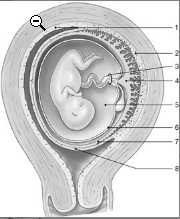From the stomach, food passes into the duodenum, then the jejunum, and then the ileum.
Answer the following statement true (T) or false (F)
True
You might also like to view...
Peritubular capillaries tend to exhibit
A. high hydrostatic pressure and high colloid pressure. B. high hydrostatic pressure and low colloid pressure. C. low hydrostatic pressure and low colloid pressure. D. low hydrostatic pressure and high colloid pressure.
During vomiting,
a. the diaphragm contracts b. the abdominal muscles contract c. the stomach contracts d. both a and b occur e. both a and c occur
Identify the structure labeled "3."

According to the text, which of the following reasons does not explain why few training needs assessments are conducted prior to the designing and delivery of training programs?
A. Training can be done to meet a legal requirement B. Sometimes training requirements are obvious C. Individuals may know what they are supposed to do but lack the ability to do it D. Certification requirements already propose training programs